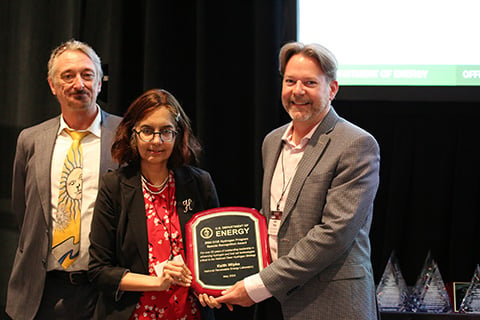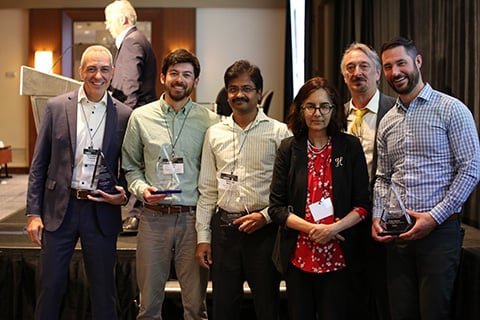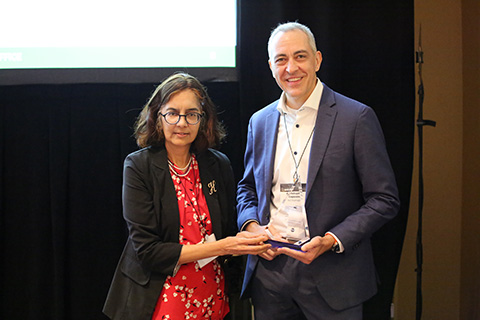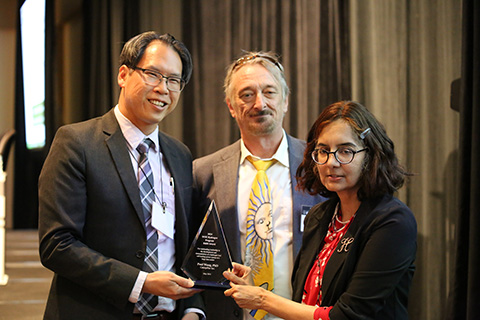2024 Annual Merit Review Awards
Each year, at the Annual Merit Review and Peer Evaluation Meeting, the U.S. Department of Energy (DOE) Hydrogen Program presents awards for contributions to the overall efforts of the Program and to recognize research, development, and demonstration achievements in specific areas.
Hydrogen Program Lifetime Achievement Award
Nenad Markovic, Argonne National Laboratory
Dr. Nenad M. Markovic of Argonne National Laboratory (ANL), Emeritus, is recognized for 40 years of invaluable dedication and contributions to advancing the fields of catalysis and surface electrochemistry. Markovic's studies of model single crystal surfaces led to a better understanding of the activity and stability of catalyst metal nanoparticles, especially for improving platinum group metal (PGM) catalyst designs for energy conversion and storage systems. Markovic's influential role in electrocatalyst research and development, notably for the oxygen reduction reaction, has contributed to the development of lower-cost fuel cells with reduced PGM content, enabling the potential for fuel cells to be competitive for a range of applications. In 2013, Markovic was named an Argonne Distinguished Fellow, the highest technical rank at ANL—with only 3% of research staff to achieve this designation.
Piotr Zelenay, Los Alamos National Laboratory
Dr. Piotr Zelenay of Los Alamos National Laboratory (LANL) is recognized for his outstanding contributions to the fields of electrocatalysis and electrochemistry. His scientific career, spanning nearly 50 years, began in Poland and included teaching and research positions at universities throughout Europe and across the United States prior to his current tenure as a staff scientist at LANL. Zelenay is commended for his invaluable contributions to advancing the field of PGM-free electrocatalysis over the past 25 years. These efforts reinvigorated the field at a critical juncture for both the broader community and the Hydrogen Program, leading directly to the founding of one of the first Energy Materials Network consortia, ElectroCat. With Zelenay still at the helm as co-chair, ElectroCat is in its eighth year of operation supporting the development of PGM-free electrocatalysts for hydrogen and fuel cell applications. Zelenay's contributions include over 220 publications and 26 patents. He has been honored as a Fellow of the Electrochemical Society, LANL Fellow, and as a Fellow of the International Society of Electrochemistry.
Hydrogen Program Special Recognition Award
Keith Wipke, National Renewable Energy Laboratory
Keith Wipke of the National Renewable Energy Laboratory (NREL) is recognized for his dedication to the Hydrogen and Fuel Cell Technologies Office (HFTO) and his outstanding impact in the advancement of hydrogen and fuel cell technologies. During his 12-year tenure as the NREL Laboratory Program Manager for these technologies, Wipke consistently impresses with his responsiveness to HFTO priorities and ability to spearhead cutting-edge RD&D activities at the lab. He serves as NREL’s representative to the Hydrogen Fuel Cell Partnership and is a board member for both the Fuel Cell and Hydrogen Energy Association and Colorado Hydrogen Coalition. Wipke is a recognized leader in stakeholder engagement, bringing together communities from industry, academia, and the national labs. Multiple media appearances highlighting the latest and greatest news and achievements have led Wipke to become a highly valued member of the hydrogen and fuel cell community.

Safety Codes and Standards; Systems Development and Integration; and Hydrogen Infrastructure
Shaun Onorato, Taichi Kuroki, and Jamie Kee, National Renewable Energy Laboratory, Krishna Reddi, Argonne National Laboratory, and Lauren Mattar, NextEnergy
Shaun Onorato, Taichi Kuroki, and Jamie Kee of NREL, Krishna Reddi of ANL, and Lauren Mattar of NextEnergy are recognized for their outstanding leadership and contributions to the development, assessment, and validation of heavy-duty fuel cell electric vehicle hydrogen fueling protocols and fueling hardware under real-world conditions. The team performed fast-flow fueling tests at NREL and benchmarked system performance exceeding industry and DOE targets; adapted the H2FillS model for heavy-duty applications; and performed analysis of fueling protocol impacts on station design, station cost, and vehicle cost. By exceeding the DOE fueling target of 10 kg/min, these fueling protocols allow a heavy-duty truck to refuel from empty in under 10 minutes, enabling hydrogen fueling to be comparable with conventional fueling times of diesel vehicles. In addition, the team developed, tested, and validated the H35 high-flow MC Formula fueling protocol, enabling the use of hydrogen-powered medium- and heavy-duty vehicles. The team's extraordinary work holds great potential to contribute to the reduction of vehicle emissions and pollution, particularly in areas with disadvantaged communities. Their active collaboration with the hydrogen industry and the international regulations, codes, and standards community demonstrates a commitment to advancing the field and promoting a pathway for commercial availability.

Hydrogen Production
Chris Capuano, Nel Hydrogen
Chris Capuano of Nel Hydrogen is recognized for his outstanding leadership in development and commercialization of low temperature electrolyzers with demonstrated reliability and performance at scale. During his more than 25 years at Nel Hydrogen, Capuano has led efforts reducing capital and operating costs of electrolyzer stacks, producing hydrogen to meet cost targets. His current efforts to improve manufacturability and decrease the cost of electrolyzers have already demonstrated a 50% reduction in precious metal catalyst loading while maintaining performance and durability. Capuano's dedication to reducing electrolyzer cost has resulted in great strides being made toward enabling large hydrogen markets and maintaining U.S. competitiveness at the original equipment manufacturing level.

Shaun Alia, National Renewable Energy Laboratory
Dr. Shaun Alia of NREL is recognized for his outstanding leadership and research efforts in three national laboratory consortia for the development of alkaline exchange membrane electrolyzers and proton exchange membrane electrolyzers. Alia is an integral member of the HydroGEN and ElectroCat consortia, where he successfully integrated a novel catalyst into a membrane electrode assembly to demonstrate >50 mV improvement in performance at 1 A/cm2 compared to commercial baseline catalysts. Alia is also highly engaged in the H2NEW consortium, where he co-leads the Accelerated Stress Test Working Group, a collaborative effort with industry to develop accelerated stress test protocols for proton exchange membrane (PEM) water electrolyzers. His scientific contributions toward understanding catalyst–ionomer interactions and fundamental degradation mechanisms in water electrolyzers have advanced state-of-the-art electrolyzers.

Hydrogen Infrastructure—Storage
Duane Byerly, Chris Wilson, and Rick Rashilla, Hexagon R&D LLC
Duane Byerly, Chris Wilson, and Rich Rashilla led the Hexagon R&D research team that made significant progress during the first phase of its low-cost carbon fiber project. The team successfully produced high-strength, continuous carbon fiber through optimized spinning and conversion processes, with projected cost reductions of more than 25%. The storage tank cost is projected to be 19% lower than that in the DOE storage program record, with an increased gravimetric efficiency of 16%. As a result, the team advanced through a highly competitive down-select into a 3-year Phase II project. In this second phase, they will focus on further improvements in performance and cost, as well as end-of-life recycling of the carbon fiber. The team includes partners Cytec Engineered Materials, Oak Ridge National Laboratory, Pacific Northwest National Laboratory, Newhouse Technology, and Kenworth.
Fuel Cell Technologies
Emory De Castro, Advent Technologies
Dr. Emory De Castro, Advent Technologies' Chief Technology Officer, is recognized for significant contributions to the development, manufacturing, and commercialization of high-temperature PEM fuel cell technologies. De Castro has been instrumental in transitioning innovative fuel cell technologies developed at the national laboratories to the marketplace through the DOE's L'Innovator program. He played a critical role in advancing the state of the art of high-temperature PEM fuel cells by demonstrating their manufacturability and commercial viability for applications ranging from small portable battery chargers to large-scale power systems.
Systems Development and Integration
Paul Wang, Caterpillar Inc.
Dr. Paul Wang of Caterpillar Inc. is recognized for his outstanding leadership and contributions to the development and demonstration of a Ballard 1.5-megawatt hydrogen PEM fuel cell system to provide power for a large Microsoft data center in Cheyenne, Wyoming. Wang led this first-of-its-kind demonstration project, which included operating the system for over 48 hours continuously at full load. The demonstration provided valuable insights into the potential to replace conventional backup diesel generators with zero-emission hydrogen fuel cell systems to power multi-megawatt data centers and ensure uninterrupted power supply to meet 99.999% uptime requirements. Development activities included designing and testing the power electronics and the necessary controls to manage power from the fuel cell, batteries, and the grid. Outcomes from this demonstration include lessons learned related to the design, data center safety (physical and virtual), hydrogen fuel logistics, and scalability.

Ron O'Malley, Missouri University of Science and Technology, and Sridhar Seetharaman, Arizona State University
Dr. Ron O'Malley of Missouri University of Science and Technology and Dr. Sridhar Seetharaman of Arizona State University are recognized for their outstanding leadership and contributions to the development, assessment, and demonstration of iron ore reduction and metallization using hydrogen in a pilot-scale reactor. The team performed three campaigns in the pilot reactor at Hazen Research, Inc.'s facility in Golden, Colorado, achieving over 95% metallization for 1.2 tons of ore, exceeding the DOE target of 1 ton of ore reduced per week with 89% metallization. In addition, the team developed a two-dimensional axisymmetric reactor model and validated it with experimental data, paving the way for scale-up and commercialization. Their active collaboration with the iron and steel industry demonstrates a commitment to advancing the field and promoting a pathway for commercial availability.
